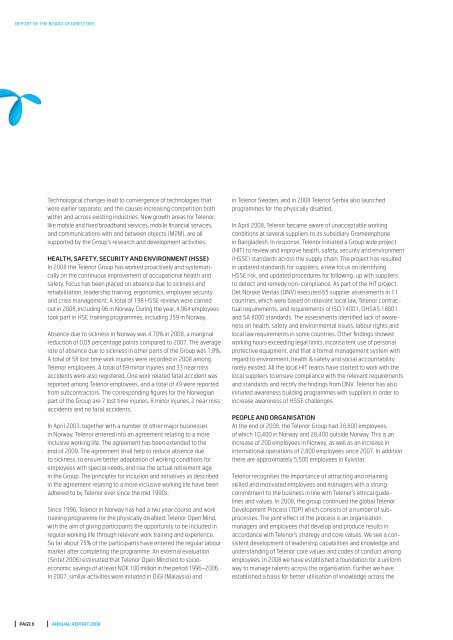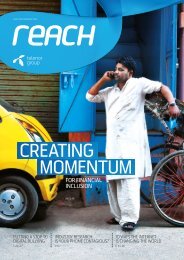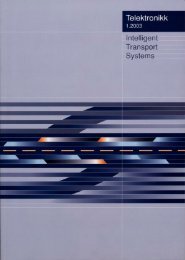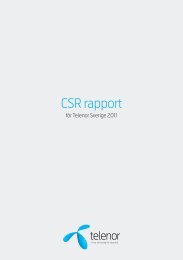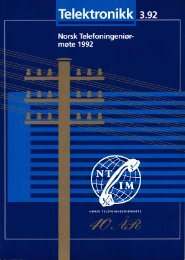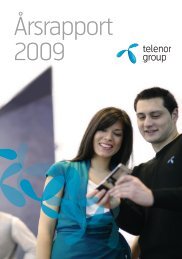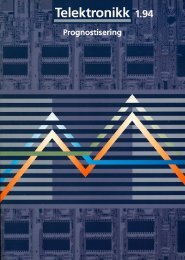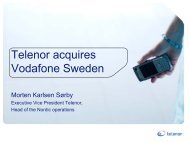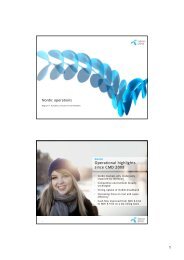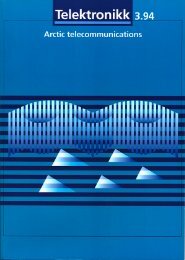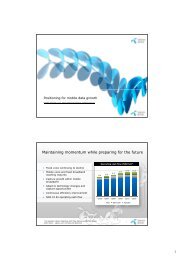Annual report 2008, 1.19 MB - Telenor
Annual report 2008, 1.19 MB - Telenor
Annual report 2008, 1.19 MB - Telenor
Create successful ePaper yourself
Turn your PDF publications into a flip-book with our unique Google optimized e-Paper software.
REPORT OF THE BOARD OF DIRECTORS<br />
PAGE 6<br />
Technological changes lead to convergence of technologies that<br />
were earlier separate, and this causes increasing competition both<br />
within and across existing industries. New growth areas for <strong>Telenor</strong>,<br />
like mobile and fi xed broadband services, mobile fi nancial services,<br />
and communications with and between objects (M2M), are all<br />
supported by the Group’s research and development activities.<br />
HEALTH, SAFETY, SECURITY AND ENVIRONMENT (HSSE)<br />
In <strong>2008</strong> the <strong>Telenor</strong> Group has worked proactively and systematically<br />
on the continuous improvement of occupational health and<br />
safety. Focus has been placed on absence due to sickness and<br />
rehabilitation, leadership training, ergonomics, employee security<br />
and crisis management. A total of 198 HSSE reviews were carried<br />
out in <strong>2008</strong>, including 96 in Norway. During the year, 4,964 employees<br />
took part in HSE training programmes, including 359 in Norway.<br />
Absence due to sickness in Norway was 4.70% in <strong>2008</strong>, a marginal<br />
reduction of 0.05 percentage points compared to 2007. The average<br />
rate of absence due to sickness in other parts of the Group was 1.8%.<br />
A total of 58 lost time work injuries were recorded in <strong>2008</strong> among<br />
<strong>Telenor</strong> employees. A total of 69 minor injuries and 33 near miss<br />
accidents were also registered. One work related fatal accident was<br />
<strong>report</strong>ed among <strong>Telenor</strong> employees, and a total of 49 were <strong>report</strong>ed<br />
from subcontractors. The corresponding fi gures for the Norwegian<br />
part of the Group are 7 lost time injuries, 8 minor injuries, 2 near miss<br />
accidents and no fatal accidents.<br />
In April 2003, together with a number of other major businesses<br />
in Norway, <strong>Telenor</strong> entered into an agreement relating to a more<br />
inclusive working life. The agreement has been extended to the<br />
end of 2009. The agreement shall help to reduce absence due<br />
to sickness, to ensure better adaptation of working conditions for<br />
employees with special needs, and rise the actual retirement age<br />
in the Group. The principles for inclusion and initiatives as described<br />
in the agreement relating to a more inclusive working life have been<br />
adhered to by <strong>Telenor</strong> ever since the mid 1990s.<br />
Since 1996, <strong>Telenor</strong> in Norway has had a two year course and work<br />
training programme for the physically disabled: <strong>Telenor</strong> Open Mind,<br />
with the aim of giving participants the opportunity to be included in<br />
regular working life through relevant work training and experience.<br />
So far about 75% of the participants have entered the regular labour<br />
market after completing the programme. An external evaluation<br />
(Sintef 2006) estimated that <strong>Telenor</strong> Open Mind led to socioeconomic<br />
savings of at least NOK 100 million in the period 1996–2006.<br />
In 2007, similar activities were initiated in DiGi (Malaysia) and<br />
ANNUAL REPORT <strong>2008</strong><br />
in <strong>Telenor</strong> Sweden, and in <strong>2008</strong> <strong>Telenor</strong> Serbia also launched<br />
programmes for the physically disabled.<br />
In April <strong>2008</strong>, <strong>Telenor</strong> became aware of unacceptable working<br />
conditions at several suppliers to its subsidiary Grameenphone<br />
in Bangladesh. In response, <strong>Telenor</strong> initiated a Group wide project<br />
(HIT) to review and improve health, safety, security and environment<br />
(HSSE) standards across the supply chain. The project has resulted<br />
in updated standards for suppliers, a new focus on identifying<br />
HSSE risk, and updated procedures for following-up with suppliers<br />
to detect and remedy non-compliance. As part of the HIT project,<br />
Det Norske Veritas (DNV) executed 65 supplier assessments in 11<br />
countries, which were based on relevant local law, <strong>Telenor</strong> contractual<br />
requirements, and requirements of ISO 14001, OHSAS 18001<br />
and SA 8000 standards. The assessments identifi ed lack of awareness<br />
on health, safety and environmental issues, labour rights and<br />
local law requirements in some countries. Other fi ndings showed<br />
working hours exceeding legal limits, inconsistent use of personal<br />
protective equipment, and that a formal management system with<br />
regard to environment, health & safety and social accountability<br />
rarely existed. All the local HIT teams have started to work with the<br />
local suppliers to ensure compliance with the relevant requirements<br />
and standards and rectify the fi ndings from DNV. <strong>Telenor</strong> has also<br />
initiated awareness building programmes with suppliers in order to<br />
increase awareness of HSSE challenges.<br />
PEOPLE AND ORGANISATION<br />
At the end of <strong>2008</strong>, the <strong>Telenor</strong> Group had 38,800 employees,<br />
of which 10,400 in Norway and 28,400 outside Norway. This is an<br />
increase of 200 employees in Norway, as well as an increase in<br />
international operations of 2,800 employees since 2007. In addition<br />
there are approximately 5,500 employees in Kyivstar.<br />
<strong>Telenor</strong> recognises the importance of attracting and retaining<br />
skilled and motivated employees and managers with a strong<br />
commitment to the business in line with <strong>Telenor</strong>’s ethical guidelines<br />
and values. In <strong>2008</strong>, the group continued the global <strong>Telenor</strong><br />
Development Process (TDP) which consists of a number of subprocesses.<br />
The joint effect of the process is an organisation,<br />
managers and employees that develop and produce results in<br />
accordance with <strong>Telenor</strong>’s strategy and core values. We see a consistent<br />
development of leadership capabilities and knowledge and<br />
understanding of <strong>Telenor</strong> core values and codes of conduct among<br />
employees. In <strong>2008</strong> we have established a foundation for a uniform<br />
way to manage talents across the organisation. Further we have<br />
established a basis for better utilisation of knowledge across the


